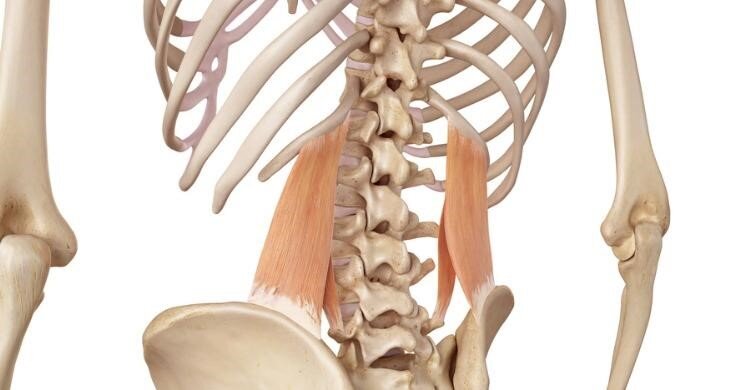It is estimated that 60-70% of people will experience lower back pain at some stage in their lifetime. One of the most common causes of lower back pain is pain coming from the “QL” muscle.
“QL” stands for quadratus Lumborum, muscles that are located on both sides of your spine between your ribcage and pelvis. These muscles help with the movement of your lower back, but also help to support your spine. QL pain can be described as a dull, aching pain which can become sharp at times from specific movements. Sometimes considered “the joker” of lower back pain, it is often overlooked as the main cause of the pain, with other lower back structures taking the blame.
Below, you can see the QL muscle positioned on either side of your spine:
Why Does My QL Cause Me Pain?
That is a very good question, and there are multiple reasons why it could be causing pain.
It is very common for the QL muscle to become tight and overactive, this is because it is compensating for other weak muscles around the area.
It can also become tight due to repetitive movement – such as twisting, bending or lifting improperly – all of which puts added stress on the muscle. As the muscle becomes tighter it can develop trigger points in the area. Trigger points are tight bands of muscle which can lead to pain.
Activities that aggravate the muscle, such as prolonged sitting, can cause the muscle to become overactive and tight which in return leads to trigger points in the muscle. This is often the reason that a lot of people who work at a desk feel lower back pain regularly.
Unequal leg length and trauma can also lead to increased QL tightness and the development of pain.
How Do I Treat QL Pain?
It is important to get your back pain assessed as soon as possible to determine the underlying issue of pain. To treat QL pain there are a few things that can be done.
Heat: Put heat on the area for 10-15 minutes. This will help improve the flexibility in the muscle and give you some short-term pain relief.
Stretches: Stretches can help target the QL muscle and give you short term pain relief. A physiotherapist can advise you on the correct stretches to do for QL pain.
Keep moving: Movement is important to prevent QL pain from developing or getting worse. If working at a desk, take regular breaks from sitting every 20-30 minutes. Go for a walk or make a cup of tea; anything to get your lower back moving!
Massage: Massage of the QL muscle can provide great results when QL pain is overwhelming. Make sure you attend a chartered physiotherapist if you have QL pain, as they are trained appropriately and can target the area specifically.
Dry needling: Dry needling can provide great relief when QL trigger points are causing pain. Once again attend a chartered physiotherapist when seeking this treatment.
Strengthening exercises: Finally completing strengthening work is essential to prevent recurrence of QL pain. A chartered physiotherapist can provide you with the most appropriate exercises to strengthen your core, lower back and bum. This will help prevent future QL pain!
For further information on how lower back pain, or if you want to have treatment for your lower back pain, book an appointment with a Chartered Physiotherapist, as we are experts in this area.


